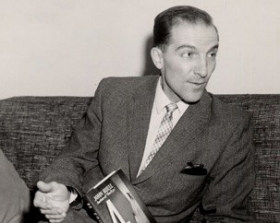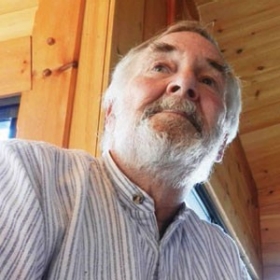I saw him seriously angry only once. In his Shakespeare seminar, he and seven students sat around a table, all of us smoking furiously. When I realized, to my dismay, that I was out of matches, I silently, so as not to interrupt the fellow who was reading his paper aloud, signalled the person next to me for a light.
He surreptitiously placed a matchbook on the table in front of me. Matchbook covers sometimes feature ads for trade schools or restaurants, but this one bore a cartoon of an owl, captioned “Hooty the Owl.” The thought that it had been someone’s job to dream up those words and write them down, get them approved by a higher up, then have them set in type made me laugh — there’s no other word for it — hysterically. Professor Buell scowled a Zeus-like scowl and I scurried, giggling, out of the room.
One evening I was invited to his home to discuss plans for the next college Drama Society production, in which he always took an interest. Hanging on a living room wall of the Buell home was a very large, framed print of Dali’s Christ of St. John of the Cross. Playing softly on the phonograph was the Missa Luba, a recently recorded setting of the Latin Mass sung by a Congolese choir. Evidently, I was in the presence of a practising Catholic intellectual. Of course, he had never flaunted his faith in class. But for six weeks in the spring he was always pretty cranky; now I realized that he, a chain smoker, had given up cigarettes for Lent.
An annual feature of Jesuit schools is a retreat, several days of tedious, compulsory chapel attendance based on the Spiritual Exercises of St. Ignatius. But one afternoon in 1961 we beheld not another fearsome black robe ascending the pulpit, but Professor Buell, wearing his tweed jacket. I was so astonished to see a layman preaching in church that I can’t recall the subject of his homily. But I do remember how he concluded: “I can’t bless you, but we can all bless ourselves.”
That, a year before Vatican II, had a thrilling whiff of heresy.
The Loyola Chapel also happens to be the last place I saw Professor Buell. We were among those attending the funeral of Father Gerald MacGuigan, S.J., longtime chairman of the English department and a teacher generations of us genuinely venerated. It was widely believed that Father MacGuigan kept a list of graduates, his “Silver Seven,” who would go on to do great things. We all hoped we were on it — but we were certain that John Buell’s name led all the rest.


 John Buell at Loyola college in the 1960s; The Pyx (1959) was the first of his five novels
John Buell at Loyola college in the 1960s; The Pyx (1959) was the first of his five novels
 Sean Kelly was an editor of National Lampoon magazine and had a successful career as a writer. He now teaches in the humanities and media studies department of the Pratt Institute in Brooklyn, N.Y.
Sean Kelly was an editor of National Lampoon magazine and had a successful career as a writer. He now teaches in the humanities and media studies department of the Pratt Institute in Brooklyn, N.Y.